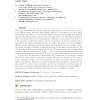Free Online Productivity Tools
i2Speak
i2Symbol
i2OCR
iTex2Img
iWeb2Print
iWeb2Shot
i2Type
iPdf2Split
iPdf2Merge
i2Bopomofo
i2Arabic
i2Style
i2Image
i2PDF
iLatex2Rtf
Sci2ools
128
click to vote
STACS
2012
Springer
2012
Springer
The Denjoy alternative for computable functions
The Denjoy-Young-Saks Theorem from classical analysis states that for an arbitrary function f : R → R, the Denjoy alternative holds outside a null set, i.e., for almost every real x, either the derivative of f exists at x, or the derivative fails to exist in the worst possible way: the limit superior of the slopes around x equals +∞, and the limit inferior −∞. Algorithmic randomness allows us to define randomness notions giving rise to different concepts of almost everywhere. It is then natural to wonder which of these concepts corresponds to the almost everywhere notion appearing in the Denjoy-Young-Saks theorem. To answer this question Demuth investigated effective versions of the theorem and proved that Demuth randomness is strong enough to ensure the Denjoy alternative for Markov computable functions. In this paper, we show that the set of these points is indeed strictly bigger than the set of Demuth random reals — showing that Demuth’s sufficient condition was too ...
Algorithmic Randomness | Classical Notion | Density Theorem | STACS 2012 | Theoretical Computer Science |
Related Content
| Added | 25 Apr 2012 |
| Updated | 25 Apr 2012 |
| Type | Journal |
| Year | 2012 |
| Where | STACS |
| Authors | Laurent Bienvenu, Rupert Hölzl, Joseph S. Miller, André Nies |
Comments (0)

